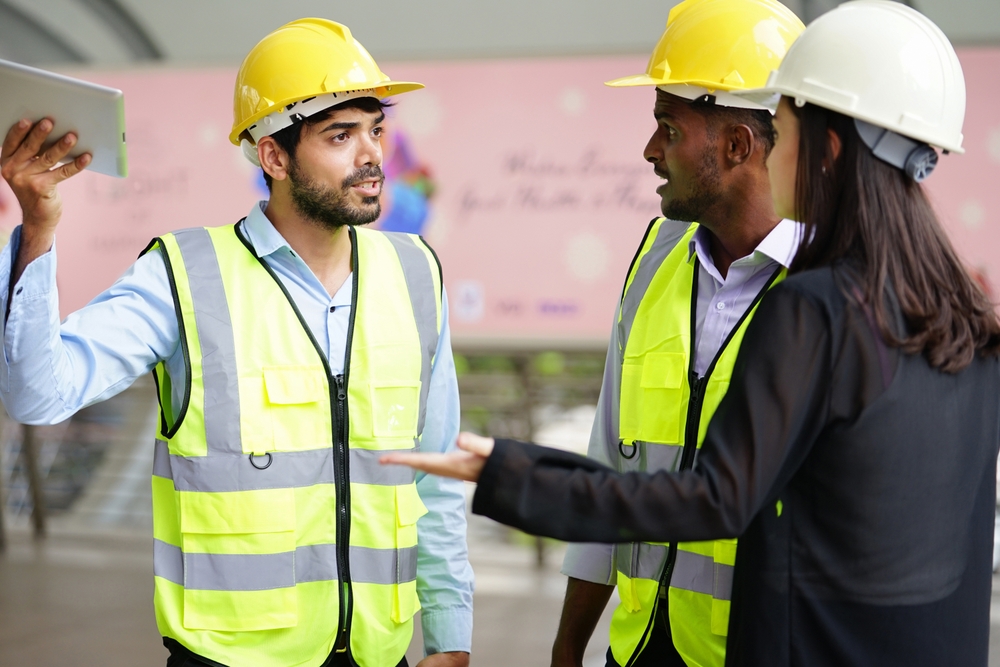In the construction industry, effective communication is essential to achieving successful completion of projects on time and within budget. Yet, despite its importance, communication in construction often faces significant challenges.
The unique nature of the construction process, with its numerous teams, dynamic environments, and intricate projects, adds layers of complexity to information sharing and collaboration. Poor communication can lead to misunderstandings, delays, and even safety risks on construction sites. On the other hand, effective communication can streamline workflows, ensure project efficiency, and enhance team morale.
In this blog, we will examine the communication challenges in construction, explore how strong communication contributes to better project outcomes, and identify some common barriers that hinder clear and effective communication.
The Impact of Effective Communication on Project Outcomes
When all parties involved in a construction project communicate clearly and consistently in a timely manner, it leads to streamlined workflows, fewer misunderstandings, and safer construction sites. A well-coordinated project saves time and reduces costs, thus enhancing the satisfaction of everyone involved, from the client to the workers on-site.
Reduced Project Rework and Costs
According to a survey by PlanGrid and FMI, poor communication causes 52% of rework in construction projects, leading to an annual industry cost of $31.3 billion in labor and materials.
Effective communication reduces rework by ensuring everyone understands the project requirements and adheres to them from the start. This not only cuts down costs but also helps projects stay on track.
Improved Safety on Construction Sites
A well-communicated project is a safer one. When safety protocols are clearly shared and key team members understand their roles, the likelihood of accidents on-site decreases.
Miscommunication, especially in high-stress environments, can lead to dangerous situations. Effective communication, therefore, plays a crucial role in risk management by keeping everyone informed of potential hazards.
Enhanced Team Collaboration and Morale
When there’s effective communication, team members feel heard, respected, and valued. This fosters a positive working environment where team morale is high, which, in turn, leads to increased productivity.
Active listening and open dialogue are key components in achieving this, allowing construction teams to collaborate effectively and work toward common goals.
Timely Project Completion
Projects in the construction sector are typically under tight deadlines. By establishing a clear communication chain and ensuring that information flows without delays, project managers can keep the construction project on schedule.
Effective communication in construction reduces the chances of unforeseen issues causing project delays, supporting a more efficient workflow and timely completion.
Common Barriers to Communication in the Construction Industry
While the benefits of effective communication in construction are clear, several barriers make it challenging to achieve on construction projects.
Fragmented Project Teams
The construction industry is known for its fragmented structure. Large projects involve architects, engineers, contractors, subcontractors, suppliers, and regulatory bodies, each with their specific roles and responsibilities. This diversity often leads to communication breakdowns, as each group may have its own communication channels and methods, resulting in a lack of cohesion across the construction project.
According to M.E.L. Hoezen, this fragmented structure limits communication processes and contributes to misunderstandings that can delay projects.
Use of Industry Jargon
The construction communication process can be hindered by excessive use of jargon. For instance, terms like “ponding” (standing water on a flat roof) or “pickling” (a finishing technique for wood) are well understood by specialists but can confuse others unfamiliar with the terms. Misinterpretation of jargon not only wastes time but can also lead to costly errors.
It is important to minimize jargon in communication to ensure that everyone, including those from different specializations, stays on the same page.
Language Barriers
Language barriers are another significant obstacle, particularly on a construction site where teams are often multinational. A study by Forbes found that 67% of employers experience miscommunications due to language differences, which can reduce productivity and cause safety risks on the construction site.
Providing language support or bilingual documentation can help overcome language barriers and ensure all workers have a clear understanding of instructions and safety procedures.
Lack of Access to Up-to-Date Information
In construction, delays in receiving updated plans, approvals, or adjustments can disrupt progress and create inefficiencies. Without real-time access to up-to-date information, teams may rely on outdated documents, leading to errors or rework.
Implementing project management tools that store and share information in real time can alleviate this barrier and enhance overall project efficiency.

Insufficient Training in Communication Tools
Even with project management software in place, a lack of training can be a hurdle. Construction teams need to understand how to use digital tools effectively to communicate project updates, document changes, and share critical details.
Without adequate training, the tools intended to improve communication in construction become underutilized, leading to gaps in information flow and coordination.
Hierarchy and Chain of Command Issues
Construction projects typically have a rigid chain, which can sometimes become a bottleneck if not managed effectively. Delays in decision-making or a breakdown in the flow of information along the chain of command can result in missed deadlines and project disruptions.
Ensuring that all key team members know this chain and their roles within it is crucial for efficient project progression.
Key Strategies for Enhancing Communication in Construction Projects
Improving communication in construction projects is essential for overcoming common industry barriers and promoting efficient project completion. Below are some key strategies to help construction professionals communicate more effectively and achieve better results.
Establish a Clear Communication Chain
Defining a communication chain is vital in construction, where multiple parties, from project managers to subcontractors, are involved. When everyone knows who to contact for specific updates or issues, information can flow smoothly and reach the right people.
A structured communication strategy improves accountability and minimizes confusion, especially in high-stress environments. Each team member’s role within this chain should be established at the start of the project and communicated clearly.
Choose the Right Communication Method
Selecting the right communication method is crucial for conveying messages effectively. While emails and phone calls may work well for general updates, some situations call for in-person meetings or digital tools.
For instance, scheduling a face-to-face meeting for complex discussions can reduce misunderstandings and clarify intricate details. Knowing when to use each communication format allows project managers to avoid ineffective communication and tailor their approach to each task’s needs.
Implement Active Listening Practices
Active listening is a fundamental skill that promotes understanding and reduces miscommunication. When team members focus on listening carefully to one another, they are more likely to capture important details and respond accurately.
Techniques like paraphrasing, asking questions, and maintaining eye contact during conversations are essential. Active listening not only improves team dynamics but also ensures that all parties feel heard and valued.
Encourage Open Communication and Transparency
Creating an environment of open communication allows team members to voice concerns or report issues without hesitation. This openness can prevent minor issues from becoming larger problems.
Transparency in communication fosters trust and collaboration, which are essential for high-functioning construction teams. Regular check-ins and a culture of openness help ensure everyone is on the same page, boosting team morale and facilitating smoother project progress.
Provide Continuous Training on Communication Skills
Many of the communication challenges in construction stem from a lack of training. Implementing regular training sessions helps team members improve their written communication, public speaking, and listening skills, equipping them to handle complex interactions better.
At Pollack Peacebuilding Systems, we offer courses specifically designed to enhance construction communication skills, which can be beneficial for teams working in diverse or multilingual environments.
Role of Technology in Facilitating Communication in Construction Management
With the increasing use of technology in the construction industry, digital tools can help facilitate communication. From project management software to AI-driven tools, technology helps teams coordinate more effectively and access up-to-date information in real time.
Project Management Software
Project management software is widely used in construction to streamline communication across multiple teams and stakeholders. These platforms allow construction professionals to track project progress, share updates, and coordinate tasks in one central location.
Tools like Procore, for instance, offer features for managing tasks, storing documents, and tracking deadlines, ensuring that all team members have access to accurate information. When implemented correctly, project management software can significantly reduce errors and rework.
Building Information Modeling (BIM)
Building Information Modeling, or BIM, is a powerful tool that enhances collaboration by creating a digital model of the entire project. This technology allows team members to visualize project changes and anticipate potential issues before they arise, providing a shared reference point for construction teams.
BIM also helps stakeholders engage in discussions about the construction process early on, reducing misunderstandings. By providing a real-time view of the project, BIM facilitates communication in construction and keeps everyone informed of design adjustments and updates.
Drones and Wearable AI
Emerging technologies like drones and wearable AI have also made a notable impact on communication in construction. Drones, for instance, provide aerial views of construction sites, allowing project managers to monitor progress remotely and identify potential hazards without needing to be on-site.
Wearable AI, such as augmented reality glasses, enables construction workers to access blueprints and project specifications while they work, minimizing the need to reference external documents. These technologies support transparent communication by giving everyone access to critical information on demand, reducing the risk of delays or accidents.
Pollack Peacebuilding Systems’s Approach to Overcoming Communication Barriers
Addressing communication barriers is central to improving collaboration and avoiding conflicts in the construction industry. Pollack Peacebuilding Systems (PPS) offers tailored services to help construction teams navigate communication challenges and enhance team cohesion.

Conflict Resolution Training
PPS provides conflict resolution training for the construction sector. This training focuses on equipping teams with the skills to manage and resolve conflicts proactively. Through workshops and interactive sessions, PPS helps team members develop communication skills that allow them to address disagreements constructively.
Communication Skills Workshops
PPS’s communication workshops are tailored to meet the unique needs of construction professionals. These sessions cover essential skills like active listening, verbal and nonverbal signals, and creating a culture of open dialogue.
By fostering these skills, PPS enables construction teams to communicate effectively, reducing the likelihood of poor communication leading to project delays or misunderstandings.
Customized Mediation Services
For projects facing persistent communication challenges, PPS offers customized mediation services. These services involve a PPS mediator who works with key team members to identify and address specific communication issues.
The mediator provides strategies to enhance team collaboration and facilitate discussions, ensuring that all voices are heard and that any communication barriers are addressed.
Team-Building Programs
Strong team dynamics are crucial for effective communication. Our team-building programs are designed to strengthen team relationships, which fosters trust and encourages open communication. Through structured activities and exercises, we help construction team members build rapport, making it easier to communicate openly and efficiently on future projects.
Cultural Sensitivity Training
In a diverse industry like construction, cultural differences can be significant obstacles. PPS offers cultural sensitivity training to help teams navigate these challenges effectively. This training promotes understanding and respect among team members, ensuring that everyone feels comfortable sharing their ideas and concerns.
To learn more about how we can support your team’s communication needs, contact Pollack Peacebuilding Systems today for customized solutions that foster effective collaboration and positive project outcomes.







